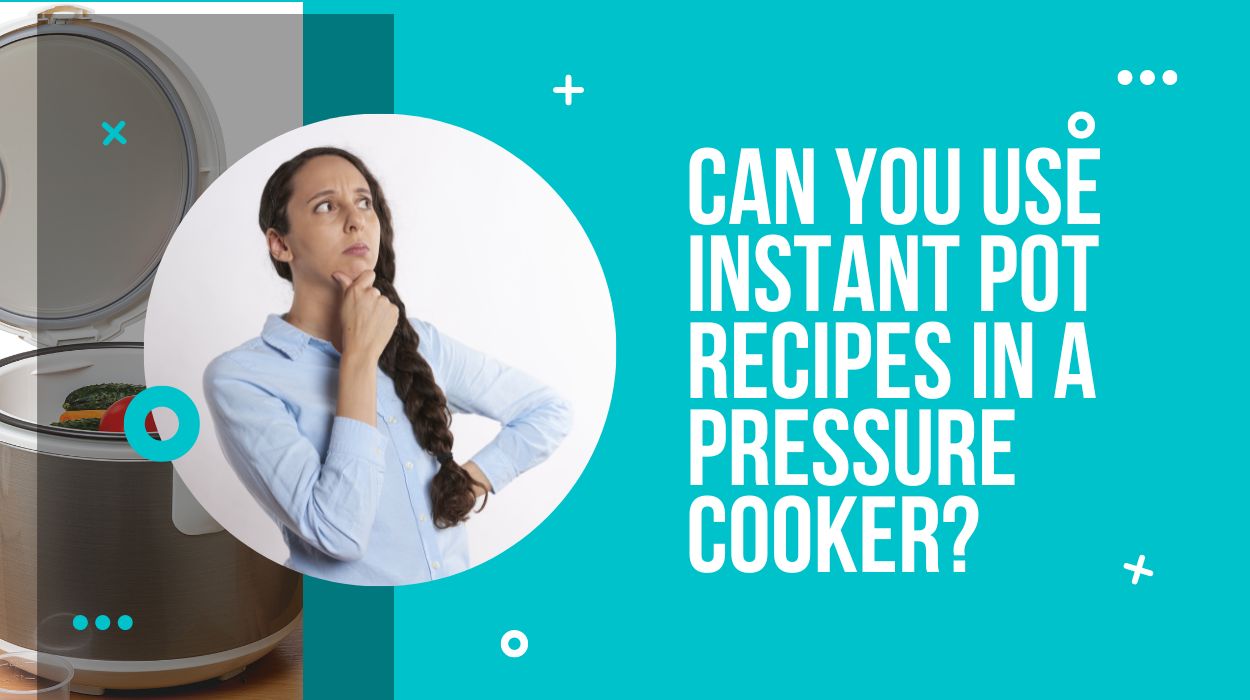So you came across a delicious instant pot recipe but didn’t have an instant pot. Now, you’re wondering if you could cook the same recipe in your pressure cooker. The brief answer is – Yes!
All you have to do is simply reduce the cooking time of the instant pot recipe by 10-15 minutes, depending on the recipe.
The reason is that pressure cookers cook food at a relatively higher pressure than an instant pot since the heat is directly supplied to the former.
This article will explain to you how to convert an instant pot recipe for a pressure cooker, the key differences in the cooking process of both cookware, some best foods to cook in a pressure cooker, and much more!
Can You Use Instant Pot Recipes In A Pressure Cooker?
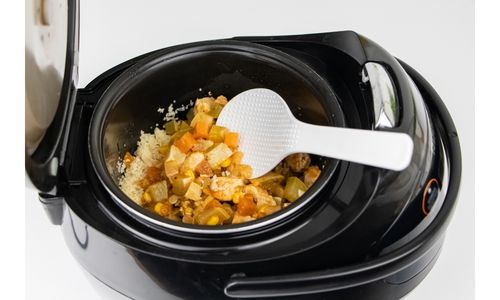
Yes, you can utilize your pressure cooker for instant pot recipes since both use the same cooking process – boiling the water to build pressure and, thereby, creating steam for cooking.
Nevertheless, since the stove’s heat directly reaches the pressure cooker’s base, it builds pressure quickly and traps steam. Consequently, foods cook faster in a pressure cooker than in an instant pot.
Therefore, while there’s not much difference in the cooking timing for most instant pot and pressure cooker recipes, you will have to cut the cooking time by 10-15 minutes for preparing tougher cuts of meat, legumes, and cereals in your pressure cooker.
Does It Alter The Taste Of The Food?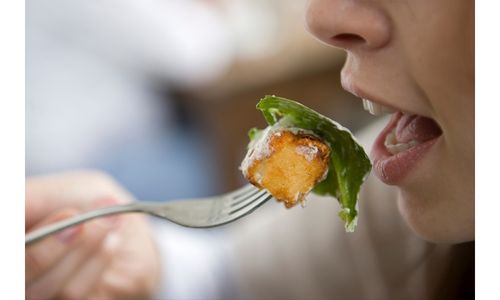
Since instant pots cook food by trapping steam, the heat is provided from every side, and the flavors get absorbed more deeply into the food.
For example, if you’re cooking a one-pot meat recipe in your instant pot, the broth/water will tenderize the meat while absorbing the flavor of spices, veggies, and other ingredients.
Whereas when you cook in a pressure cooker, you require a stovetop for heating the appliance. This indicates that heat is applied straight to your pressure cooker’s base. You can make use of this heat to sauté your ingredients.
For example, vegetables such as onions, ginger, garlic, etc. develop a beautiful golden-brown color when you sauté them on medium flame. This also enhances the flavor of your recipe and reduces cooking time.
Tip: Dry roasting legumes and lentils for 3-5 minutes before adding water to make them taste better.
How Do The Cooking Times Change Using Instant Pot Recipes In A Pressure Cooker?
When you cook an instant pot recipe in a stovetop pressure cooker, the cooking time will be reduced by 10-15 minutes.
Moreover, if you add boiled water into the pressure cooker, you can reduce the cooking time by 5 more minutes since it is the time water takes to reach its boiling point (212°F)
Since slightly less heat is applied to the appliance when you cook food in an instant pot than in a pressure cooker.
That’s why an instant pot will take more time to heat water and build pressure for cooking. Sometimes, this cooking time increases by 2-5 minutes (for rice and pasta recipes) and sometimes by 10-15 minutes (usually for meat recipes).
Author’s Note: Cut your meat into smaller pieces before putting it in the pressure cooker to reduce cooking time.
Is There A Difference To Using Instant Pot Recipes In A Pressure Cooker?
Yes, there are two main differences between using an instant pot recipe in a pressure cooker. They are – reducing the cooking time and agitating the pan.
As we have already mentioned, reducing the cooking time is important for cooking an instant pot recipe in your pressure cooker because pressure builds relatively faster in a pressure cooker.
This increased pressure in a pressure cooker implies that you need to reduce the cooking time of your recipe. Otherwise, your food might get overcooked or burnt.
Moreover, you need to agitate the pan when cooking in a pressure cooker since the heat is not distributed evenly, unlike in that of an instant pot. This will increase the chances of your food getting charred if you don’t keep stirring it at regular intervals.
Author’s Note: For your pressure cooker recipes, always add thickeners only after the food is cooked. Otherwise, the liquid in the cooker will not come to a boil, and the pressure will not build up.
Before You Convert A Recipe, Ask Yourself: Is The Recipe A Good Choice For The Pressure Cooker?
To know if your recipe is a good choice for a pressure cooker, you need to ensure that it has liquid. Since pressure cookers require liquid to create steam and build pressure, your recipe must have at least ½ cup of liquid such as water, stock, or broth.
Moreover, if you’re planning to cook crispy foods in your pressure cooker, such as fried chicken or veggies, pies, etc., you won’t get satisfactory results since these foods can turn soggy.
Also, very lean meats such as fish can break down into small pieces if cooked in a pressure cooker.
However, your pressure cooker can give you great results if you use it for preparing curries, soups, beans, lentils, and beef recipes. The best part about pressure cookers is that they can tenderize even the hardest meats in relatively less time!
Author’s Note: Substitute water with chicken/beef/vegetable stock in your recipes for a rich taste and flavor.
How To Determine The Cooking Time When Converting A Recipe For Pressure Cooker?
The easiest way of knowing the cooking time to convert a recipe for your pressure cooker is to search for a similar recipe either in a cookbook or on the internet and refer to the cooking time of that recipe.
Moreover, for cooking mutton or beef, you can reduce the cooking time by ⅔. Also, you can reduce the cooking time by ½ for lentils, rice, and pasta recipes.
Furthermore, an instant pot usually cooks chicken recipes in around 15-20 minutes (5-10 minutes for building pressure and 10 minutes for cooking.)
But if you cook the same recipe in a pressure cooker, you can reduce the cooking time by 5 minutes since a pressure cooker builds pressure faster as compared to an instant pot.
How Much Liquid Should I Use To Convert An Instant Pot Recipe Into A Pressure Cooker Recipe?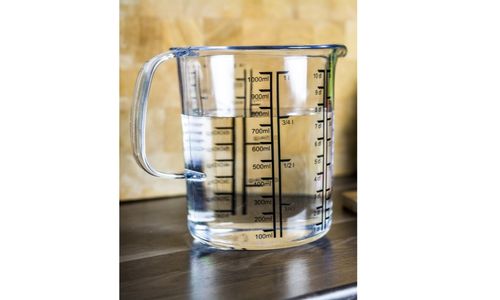
As a general rule, you need to use at least 1 cup of liquid to convert an instant pot recipe to a pressure cooker recipe.
However, if you’re cooking watery foods such as chicken, asparagus, zucchini, bell peppers, radish, mushroom, etc., you will have to reduce the liquid.
Ask why. Because when you cook in a pressure cooker, the steam is trapped, and there is minimal loss of liquid. Therefore, adding more than 1 cup of water will affect the flavor and texture of your recipe and may break down your food.
What happens if I don’t add water to my pressure cooker?
You need to add some water (½-¹ cup) or any other liquid such as broth into your pressure cooker to function.
The reason behind this is that steam builds up from the water, which creates a high pressure in an instant pot to cook food.
If you don’t add any liquid, the pressure will not increase, and your food will not cook properly and may even get burnt.
Can I add too much water to my pressure cooker?
No, you should not add too much water into your pressure cooker since it requires some space to build pressure and create steam. If the steam is not created, the water will dry out, and as a result, your food may get burnt.
Moreover, too much water can turn your dishes soggy; break down the vegetables or lean meats such as chicken, and lead to a loss of flavor and taste of food.
Therefore, in most cases, you shouldn’t fill your pressure cooker with more than half water or any other liquid. Precisely, here’s how much water you need to add to your pressure cooker, depending on different foods:
- For soups, curries, and casseroles – not more than ½.
- For meat and vegetables – not more than ⅔.
- For rice, cereals, and pasta – not more than ⅓.
Warning: Too much water can block your pressure cooker’s steam vent and cause it to explode.
What Are The Best Things To Cook In A Pressure Cooker?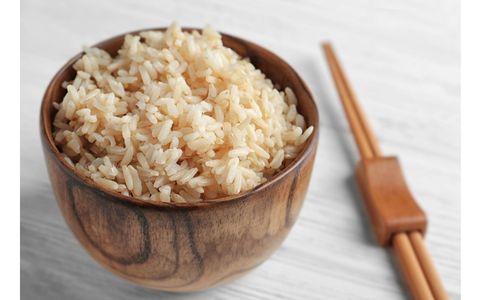
The best foods to cook in a pressure cooker are:
- Kidney beans
- Chickpea
- Lentils
- Hard meats such as lamb and beef
- Whole Chicken
- Pumpkin
- Soups and curries
- Brown rice
- Quinoa
- Oats
- Barley
- Vegetables such as cauliflower, spinach, cabbage, carrots, artichoke, zucchini, etc.
FAQs
1. Why are pressure cookers unhealthy?
Pressure-cooking certain foods can be unhealthy for you. For example, if you cook starchy vegetables such as potatoes or white rice in your pressure cooker, a carcinogenic substance called acrylamide is formed.
Moreover, the high heat formed in pressure cookers also reduces the nutrients in many foods, especially those foods that are rich in folate and vitamin C.
2. What makes a pressure cooker explode?
There are many reasons why a pressure cooker can explode. The most common among them are: overfilling your pressure cooker, their vents being clogged by grease and food debris, not using the oil properly, cheap quality of the pressure cooker, and exploding as a result of a malfunction.
3. What foods you shouldn’t put in an instant pot?
Some foods don’t turn out great when put in an instant pot because of high pressure and moisture. For instance, cooking creamy sauces in an instant pot make the cheese and milk curdle or separate.
Moreover, using your instant pot for cooking fried chicken will make it soggy.
Furthermore, pies and cookies turn soggy and don’t get their chewy edges and a hard, golden crust when cooked in an instant pot.
4. Can I put seasoning in my pressure cooker?
You shouldn’t put herbs such as thyme, rosemary, cilantro, chives, basil, etc., in your pressure cooker since high heat and moisture will reduce their aroma. Instead, we recommend you crush these herbs on your hands to release their aroma and toss them onto your recipe once it is cooked.
Conclusion
Both pressure cookers and instant pots cook food quickly. However, since the pressure builds up quickly in a pressure cooker, it reduces the cooking time of an instant pot recipe by 5-10 minutes.
Also, both pressure cookers and instant pots require liquid to function.
So do you prefer an instant pot or a pressure cooker for cooking? How was your experience of converting your instant pot recipe to a pressure cooker? Please let us know!
